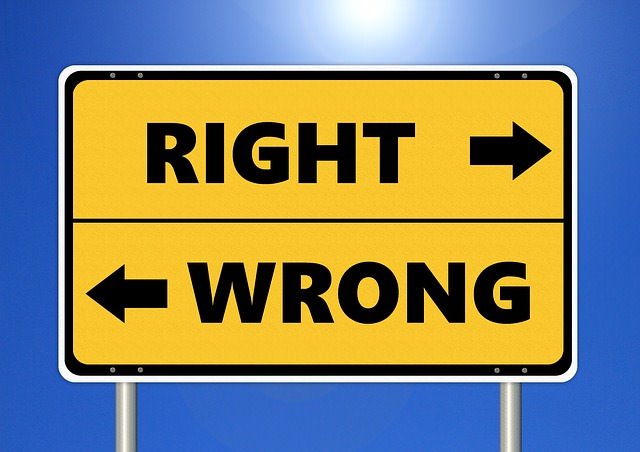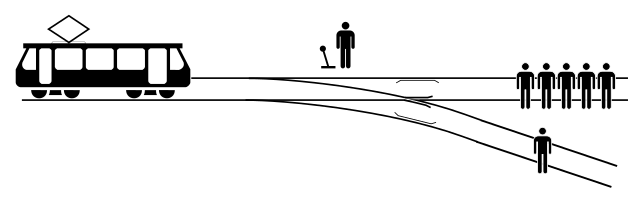Hypothetical Moral Judgments vs. Real-Life Moral Actions
We don't need to do immoral things to learn about morality. But, when we're not in a situation ourselves, we can think we would do something, yet when that situation actually happens we end up not acting the way we thought we would.

Source
Hypothetical scenarios are useful to evaluate something without actually doing it, and psychological studies like to employ this method to evaluate what people think. Moral quandaries allow us to think about what moral or immoral behavior is. A recent study published in Psychological Science shows that thought-experiment scenarios don't measure up to reflect the real-deal. Real-life situations get people to think in terms of the outcome of their decision and less on absolute moral principles compared to hypothetical quandaries.
There appears to be a disconnect between hypothetical moral judgment and real-life moral behavior. Moral judgments can be largely unrelated to real-life behavior, where judgments don't predict behavior.
To arrive at these conclusions, a study involving 192 university students had them complete an online questionnaire with hypothetical moral dilemmas. The participants were evaluated on the desire for cognitive challenge, antisocial tendencies, empathic concern, perspective taking, moral identity, and animal empathy.
Two weeks later they were brought to a research lab where two metal cages were hooked up to an electroshock machine. One cage had 5 mice, the other had 1. A 20-second countdown would result in a nonlethal painful shock to the 5 mice unless participants chose to press a button to shock one mouse instead (but no mice would be shocked in the end). Participants were then asked to justify why they did what they did and measured the doubt and discomfort felt.
Another group in the study did the same questionnaires, but only did a hypothetical version of the mouse shocking experiment. Results shows that the second group was twice as likely to choose the passive option of doing nothing compared to the participants faced with a real-life decision to make.
This was a variation of the famous trolley problem. Do you pull a lever to to divert a runaway trolley and kill 1 person, of do you let the trolley go on the current track to kill 5 people?

Source
The conclusions show that the many decades of research on the trolley problem indicate that only focusing on the hypothetical decision-making is missing out on accurately assessing real-life moral behavior. Different factors can affect the actual behavior as well, such as mice being used instead of humans. But unless someone has disregard for animals, then the moral considerations should be the same in both scenarios.
An interesting thing is that participants who chose to get involved and press the button to harm one, instead of letting 5 be harmed, seemed more apologetic during the debriefing sessions. Dries H. Bostyn of Ghent University, first author of the paper, says:
"It could be that with hypothetical judgments we are free to pick the option that is most socially acceptable as we do not have to live with the consequences of that decision. However, in real life, the pressure to 'do the right thing' is much bigger."
I find it telling how people who chose to push the button and harm 1 instead of letting 5 be harmed indicated a taking on of responsibility and culpability for their actions. If you want to not be responsible for anyone being harmed, you just do nothing. You didn't put the mice in a cage to be electrocuted, nor would you have set the trolley to runaway or put 5 people on the tracks. If you do nothing, none of what happens is your fault. But, if you choose to get involved and change the circumstances of how the event plays out, then you are the one who is choosing to harm 1 mouse instead of 5, or kill 1 person instead of 5.
I also find it telling that even the researchers admitted the moral considerations to non-humans apply just as they do for humans. Yet, for most of us humans, we fail to recognize the harm and violence being done to other animals just so we can keep eating them, when we can choose to be healthy by not taking their lives to eat them. This is a moral disconnect between our way of life and our individual desire to be moral.
Do you think you're moral judgments are aligned with your in-the-moment real-life moral decision and actions? What would you do in the trolley problem? Do you want to be responsible for harming/killing 1, or letting 5 be harmed/killed and not be responsible for it?
References:
- People make different moral choices in imagined versus real-life situations
- Dries H. Bostyn et al, Of Mice, Men, and Trolleys: Hypothetical Judgment Versus Real-Life Behavior in Trolley-Style Moral Dilemmas, Psychological Science (2018). DOI: 10.1177/0956797617752640
- Trolley problem
Thank you for your time and attention. Peace.
If you appreciate and value the content, please consider: Upvoting, Sharing or Reblogging below.
 me for more content to come!
me for more content to come!
My goal is to share knowledge, truth and moral understanding in order to help change the world for the better. If you appreciate and value what I do, please consider supporting me as a Steem Witness by voting for me at the bottom of the Witness page.


C’mon people! I was hoping to see more comments here! Here’s an answer that the ego can’t stand because it does not satisfy - I don’t do hypotheticals. In any given situation, you look for ways to do what’s right. The trolly problem prohibits any other options, but when you’re actually placed in front of something - like with the mice - new options present themselves.
How about pulling the wires out of the mouse boxes? How about grabbing the instructor around the throat and insisting the lab techs release the mice or you’ll snap his neck? After all, he’s a captor and a torturer, so it’s an act of defense to protect the innocent.
The point is that hypotheticals railroad you into an unnatural situation. Morality is a function of consciousness, and we have more growing to do before we can answer any question theown at us. We know enough about morality to get along, just like we know enough about physics to get by, but there’s more to discover and though these hypotheticals can challenge us to grow, failing to come up with a satisfying answer doesn’t obviate what we do know.
One die, five die, whatever... your whole life will likely go by without you ever encountering something so outlandish, so don’t worry about that; just get straight what you’re actually doing in your own life according to what you already understand.
Yes, I forgot to talk about the false dichotomy of these scenarios, oops :P There are often more than simply 1 or 2 options to choose from.
That’s ok, these scenarios are intended to pit the utilitarian perspective against the categorical, and they served their purpose well enough. Though I would suggest that they tend to railroad (no pun) the proponent of the latter into adopting the former perpective, which I think does the uninitiated student a disservice.
Utilitarianism, as you’ve no doubt concluded yourself, has deplorable practical consequences, and if applied at all, should be reserved for last resort scenarios like those presented in your post. But the “why” of this conclusion matters, and you’ve presented the problem well for readers to consider on their own.
My first thought was what you came to. Refuse to shock any of them. And in the case of a real life decision, if a third party is demanding you choose the murder of one or multiples, one could always choose to hand that fate to the one issuing the ultimatum if they are stupid enough to be close to you while giving it.
Yes, false dichotomies can pose interesting questions, but there are other options usually. But in the end, if you can't do much more, you don't have to be responsible to harm someone just because another person is making threatening to harm more than 1 person. It's like "kill this baby or I kill you"... there is always a choice. Don't do the immoral thing of murdering a baby, or choose your survival and murder a baby...
I would like to think that folks would not choose to kill five people over one. To pull the lever you harm one. I think that it depends how evil you really are inside. A sense of compassion and love play a part. A morally grounded person would try to save as many as possible. But with a world of selfishness, lack of true integrity and refusal to follow an ultimate truth compass from a spiritual stand point, I suppose some folks would not care and even get a thrill off of it. Sick. Thanks @krnel A third option may have been to stop the train before it could kill anyone.
There are often other options, but in the moment there may be little time to think of them :/
I tend to think these issues in terms of meaning. There seems to be like an ideology debate between: People who understand there is meaning, but anything can become true for humans, therefore anything can become meaning; and people who believe there is no meaning, there is no moral, there is no justice, so why should I compromise with anything?
I must admit, the cynical position is tempting, but kind of cowardly, and I have always hated my own cowardice, so no way José, I believe in the love of my mother, the trust of my brothers, I don't know if I would pull the lever or press the button, maybe I would just open the boxes and destroy the experiment, I dont know, what I do know is that it does matter, it has meaning, and my decisions will escort me for the rest of my life. Love your post.
What a dilemma. I would like to think that the idea proposed by @enjoywithtroy is possible, make a third path to keep everyone happy. Apply break and stop everything.
But there is no break, that's why it's a runaway trolley ;)
:o then the person that is alone.... this is choose between two evils.
Moral dilemmas, such as pulling this lever or not, are situations in which no solution is satisfactory. They are crossroads that challenge everyone who tries to create rules to decide what is right and what is wrong, from jurists to philosophers who study morals.
You are not responsible for the scenario. To avoid moral responsibility, the choice is to not pull the lever and harm one. That's why those who did it, were apologetic, because they took an action that resulted in harm. They took on a responsibility of an action they engaged in. To not engage in action makes one not responsible for any actions, as no actions was taken.
nice content loved it so much hoping to see more from you nice content
Excellent your post friend you have my vote, greetings from Venezuela
Good article - thanks. Momz
Many human actions are related to good and bad actions, but not all actions are related to good and bad in terms of ethics.
You scratched your head with your left hand, nothing to do with morality. You receive a salary, use it first for hobbies or fun with friends and just give the rest to the wife, it's moral related. Therefore, it is called moral action.
Thus, moral action is a deliberate act of humanity and is associated with good and bad judgments. This is what ethics is concerned about.
So far our conclusion is: man can determine action, he can choose his actions. However, ethics is considered only moral action, and is called a moral action. Man with free will can make moral choices.